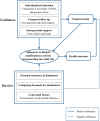Actively incorporating lifestyle modifications into daily life: The key to adherence in a lifestyle intervention programme for metabolic syndrome
- PMID: 35979455
- PMCID: PMC9376606
- DOI: 10.3389/fpubh.2022.929043
Actively incorporating lifestyle modifications into daily life: The key to adherence in a lifestyle intervention programme for metabolic syndrome
Abstract
Introduction: Lifestyle modifications are the first-line interventions for metabolic syndrome (MetS) management. The effectiveness of lifestyle interventions depends mostly on participants' adherence to the interventions. The current study was to explore the experiences of MetS patients in attending lifestyle intervention program (LIP) and the factors that influenced their adherence to the interventions.
Methods: A descriptive qualitative study was designed following the COREQ guideline. Face-to-face semi-structured individual interviews were conducted with a purposive sample from the participants who attended the LIP using the data saturation principle. Content analysis of transcripts was conducted following the methods proposed by Graneheim and Lundman.
Results: The study recruited 27 participants, including 13 males and 14 females. Four themes were identified: (i) the positive and beneficial experiences of attending the LIP, including incorporating lifestyle modifications into daily life, improved physical and psychological health, and empowerment; (ii) facilitators of adherence, including individualized lifestyle education, regular follow-ups, and adequate interpersonal support; (iii) barriers to adherence, including personal resistance, competing demands, and contextual factors; (iv) suggestions for future interventions: with multidisciplinary team, longer term intervention, and more efficient approaches. The findings also indicated that young-to-middle aged patients faced more conflicts with role-related commitments, and were open for e-approaches in lifestyle interventions.
Conclusion: The LIP provided positive and beneficial experiences for the participants. Actively incorporating lifestyle modifications into daily life is the key to maintain participants' adherence to the LIP. Culturally appropriate and psycho-behavioral strategies should be adopted to overcome personal and contextual barriers. Special attentions should be paid for the young-to-middle aged population in MetS management.
Keywords: adherence; experiences; lifestyle intervention; metabolic syndrome; qualitative research.
Copyright © 2022 Wang, Chair, Wong and Qiu.
Conflict of interest statement
The authors declare that the research was conducted in the absence of any commercial or financial relationships that could be construed as a potential conflict of interest.
Figures
Similar articles
-
Development of an individualized WeChat mini program-based intervention to increase adherence to dietary recommendations applying the behaviour change wheel among individuals with metabolic syndrome.Ann Med. 2023;55(2):2267587. doi: 10.1080/07853890.2023.2267587. Epub 2023 Oct 29. Ann Med. 2023. PMID: 37898907 Free PMC article.
-
Acceptability and impact of a lifestyle intervention for systemic lupus erythematosus: Qualitative analysis of living well with lupus study.Lupus. 2025 Apr;34(5):474-483. doi: 10.1177/09612033251326986. Epub 2025 Mar 13. Lupus. 2025. PMID: 40083122 Clinical Trial.
-
The Effect of Different Interventions for Lifestyle Modifications on the Number of Diagnostic Criteria and Clinical Aspects of Metabolic Syndrome.Metab Syndr Relat Disord. 2021 Feb;19(1):8-17. doi: 10.1089/met.2019.0132. Epub 2020 Oct 21. Metab Syndr Relat Disord. 2021. PMID: 33090083 Clinical Trial.
-
Overcoming barriers to engagement and adherence to a home-based physical activity intervention for patients with heart failure: a qualitative focus group study.BMJ Open. 2020 Sep 21;10(9):e036382. doi: 10.1136/bmjopen-2019-036382. BMJ Open. 2020. PMID: 32958484 Free PMC article. Review.
-
Managing pediatric metabolic syndrome: a systematic review of current approaches.BMC Pediatr. 2025 May 28;25(1):431. doi: 10.1186/s12887-025-05759-6. BMC Pediatr. 2025. PMID: 40437390 Free PMC article.
Cited by
-
Effects of an Individualized mHealth-Based Intervention on Health Behavior Change and Cardiovascular Risk Among People With Metabolic Syndrome Based on the Behavior Change Wheel: Quasi-Experimental Study.J Med Internet Res. 2023 Nov 29;25:e49257. doi: 10.2196/49257. J Med Internet Res. 2023. PMID: 38019579 Free PMC article.
-
Antidiabetic potentials of gypenosides: A review on the preclinical effects in glucose and insulin modulation as well as diabetes-related complications.Naunyn Schmiedebergs Arch Pharmacol. 2025 May 24. doi: 10.1007/s00210-025-04265-x. Online ahead of print. Naunyn Schmiedebergs Arch Pharmacol. 2025. PMID: 40411617 Review.
-
Health-related quality of life in adults with metabolic syndrome: a multi-level analysis of family and individual level variation.BMJ Open. 2024 Nov 18;14(11):e087870. doi: 10.1136/bmjopen-2024-087870. BMJ Open. 2024. PMID: 39557558 Free PMC article.
-
Development of an individualized WeChat mini program-based intervention to increase adherence to dietary recommendations applying the behaviour change wheel among individuals with metabolic syndrome.Ann Med. 2023;55(2):2267587. doi: 10.1080/07853890.2023.2267587. Epub 2023 Oct 29. Ann Med. 2023. PMID: 37898907 Free PMC article.
-
A pilot study on the relationship between thermal habits, chronic inflammation, and arterial stiffness in young adults.BMC Res Notes. 2025 Apr 14;18(1):166. doi: 10.1186/s13104-025-07236-w. BMC Res Notes. 2025. PMID: 40229818 Free PMC article.
References
-
- International Diabetes Federation . The IDF Consensus Worldwide Definition of the Metabolic Syndrome. Belgium: IDF; (2006).
-
- Huang JJ, Huang JL, Withers M, Chien KL, Trihandini I, Elcarte E, et al. . Prevalence of metabolic syndrome in Chinese women and men: a systematic review and meta-analysis of data from 734,511 individuals. Lancet. (2018) 392:S14. 10.1016/S0140-6736(18)32643-6 - DOI
-
- Alberti KG, Eckel RH, Grundy SM, Zimmet PZ, Cleeman JI, Donato KA, et al. . Harmonizing the metabolic syndrome: a joint interim statement of the International Diabetes Federation Task Force on Epidemiology and Prevention; National Heart, Lung, and Blood Institute; American Heart Association; World Heart Federation; International Atherosclerosis Society; and International Association for the Study of Obesity. Circulation. (2009) 120:1640–5. 10.1161/CIRCULATIONAHA.109.192644 - DOI - PubMed
Publication types
MeSH terms
LinkOut - more resources
Full Text Sources
Medical


